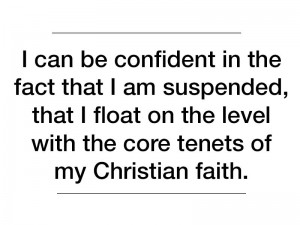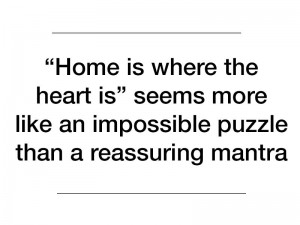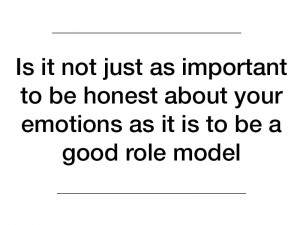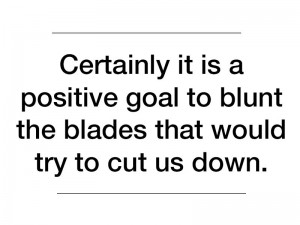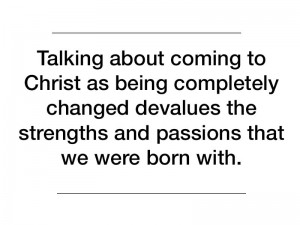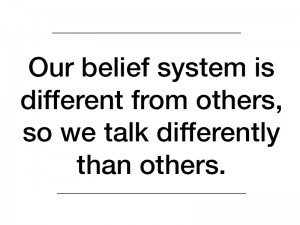In the beginning of October, Lenny Luchetti spoke in chapel on the virtues of worshipping God with the head as well as the heart. He explained that when he first began attending college, he loved to lose himself in the feeling of worship through praise songs, a semi-charismatic and hands-in-the-air kind of guy. He would observe with slight disdain the behaviors of others who sat quietly through worship services without actively taking part. Eventually, as he grew in his faith while at school, his perceptions changed, and the point he made was that God deeply values the efforts of the mind and the act of praise through academics and critical thought. What he left to be inferred, however, was that both methods of connection to God are equally worthwhile, and that it is merely a matter of personality which form of worship one chooses to employ. I would argue that this is not true, and that worshiping God with the “heart” is not really worship at all.
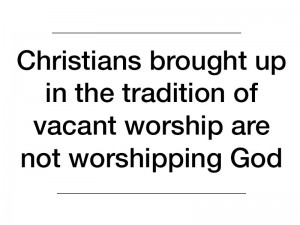 The other day while I was driving, Jamie Grace’s “Beautiful Day” came on the radio. The “It’s been ‘like’ a whole day” in the first verse managed to slip by me unnoticed the first time around, but the chorus left me incredulous and indignant. After a few bouncy lines about how happy God makes her, Grace sings, “This feeling can’t be wrong/ I’m about to get my worship on/ Take me away,” implying, or rather, explicitly stating that worship is some kind of altered state of being one enters into with the expectation that they will come away feeling blissful and transcendent, reminiscent of a drug-induced high or the rush of sexual intercourse. In her Grammy-nominated song “Hold Me,” Grace reinforces this interpretation with the lyrics, “I’ve had a long day, I just wanna relax … I know I should be working but I’m thinking of you” in which Jesus is essentially equated with a happy hour cocktail, and put at odds with “work,” which I can only assume Grace is not, in this case, using as a means to honor Him.
The other day while I was driving, Jamie Grace’s “Beautiful Day” came on the radio. The “It’s been ‘like’ a whole day” in the first verse managed to slip by me unnoticed the first time around, but the chorus left me incredulous and indignant. After a few bouncy lines about how happy God makes her, Grace sings, “This feeling can’t be wrong/ I’m about to get my worship on/ Take me away,” implying, or rather, explicitly stating that worship is some kind of altered state of being one enters into with the expectation that they will come away feeling blissful and transcendent, reminiscent of a drug-induced high or the rush of sexual intercourse. In her Grammy-nominated song “Hold Me,” Grace reinforces this interpretation with the lyrics, “I’ve had a long day, I just wanna relax … I know I should be working but I’m thinking of you” in which Jesus is essentially equated with a happy hour cocktail, and put at odds with “work,” which I can only assume Grace is not, in this case, using as a means to honor Him.
I do not mean to personally insult the no-doubt well-meaning Jamie Grace. What I do mean, however, is to question the ease with which Christian society accepts this kind of bubblegum Christian pop praise music without any basis in scripture or intentional theology. Worship is intended to be a thoughtful meditation on the grace and the goodness of God, a practice that should no doubt invite feelings of gratitude, joy, and peace, but that should nonetheless find its roots in concentrated study and reflection. The concept of worship as it is found in the majority of contemporary praise and worship songs is that of “chasing the feeling,” craving the joy without the contemplation, the intimacy without the commitment, the sex without the relationship.
People do worship in different ways. I would not try to take away from those who connect most fully with God through music the right to do so freely and with joy. But there cannot be a divide between innervation and cerebration. Those who worship through song must be able to count on the lyrics to be studied and deliberate. Difficult and far-reaching questions that exist within the Christian faith can have devastating effects on those seeped in the superficial, sensationalist theology of pop praise music. They are not taught to ask, and they are unprepared to answer. In the words of Grace, “I’ve got not need to worry, I’ve got no room for doubt,” but what exactly grants her such infallible certainty is unclear, and in a faith as encompassing and exacting as the Christian faith, there can be no room for sentiment without qualification. Impassioned worship without a strong grasp on the basics of Christian theology is meaningless and empty, and Christians brought up in the tradition of vacant worship are not worshipping God, they are worshipping a semblance of the side effects of God’s entity. They are worshipping titillation.
I want to reassure you that I recognize the usefulness and, in fact, necessity of music in worship. The Bible would not contain so many references to praising God with song if it was not an important aspect of our faith. But let us never fail to recognize the dependence of meaningful emotional connection with God on intelligent and critical examination of our beliefs.

